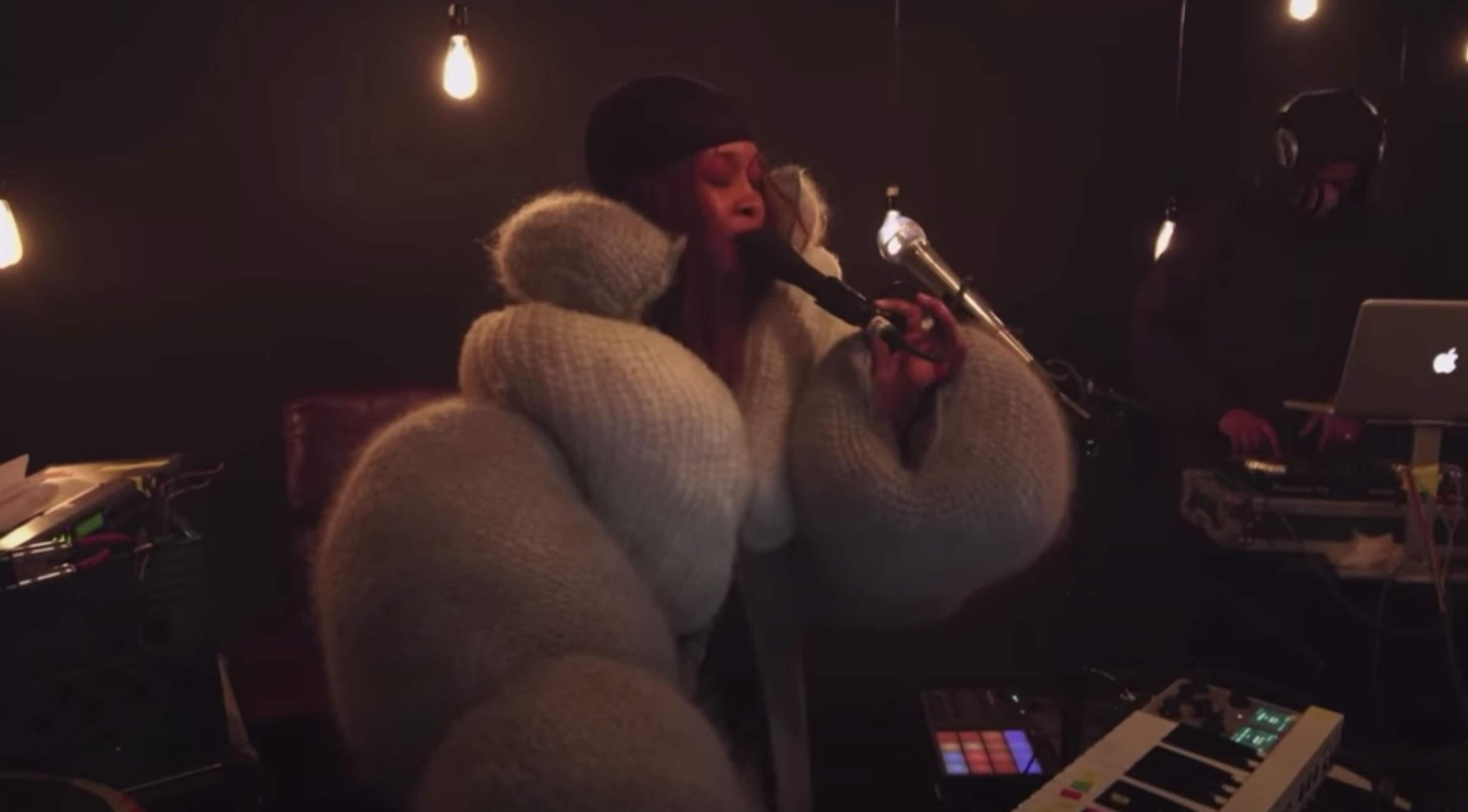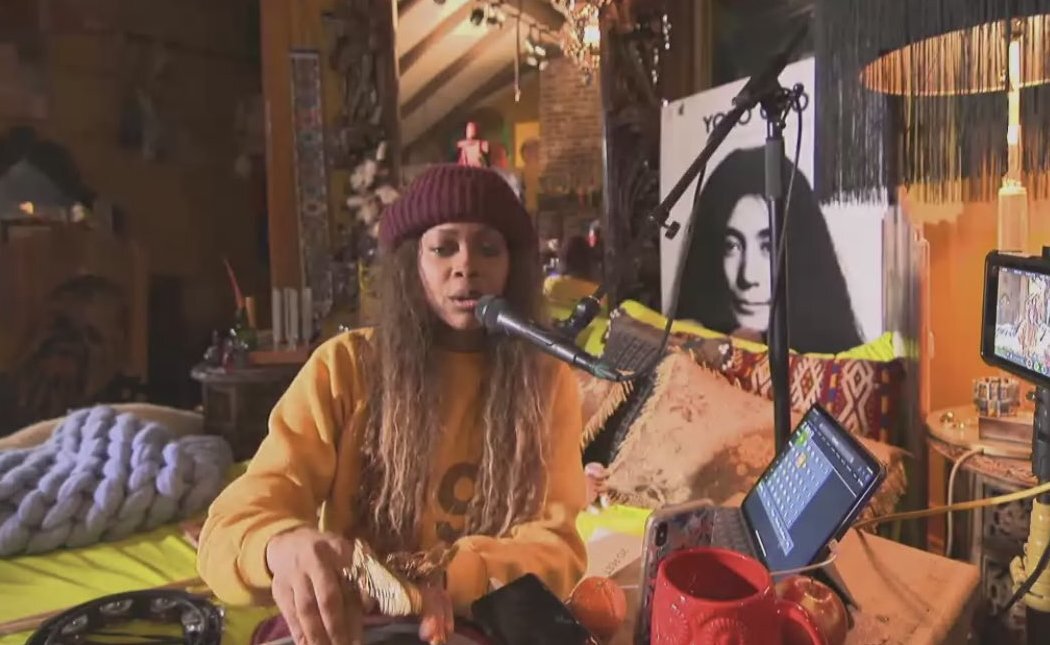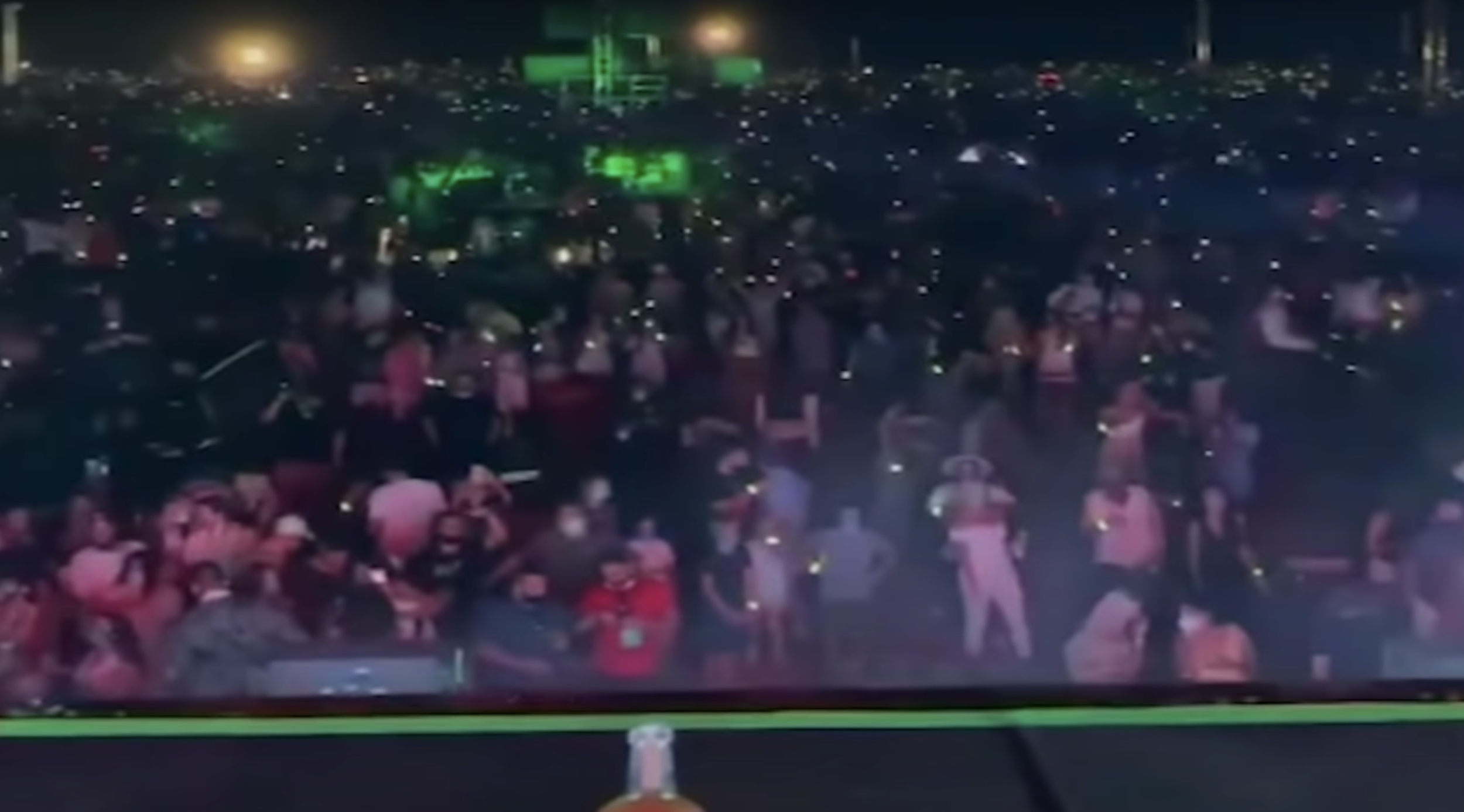Musicians Move Live-Stream Concerts Beyond a Virtual Royal Street

Erykah Badu in a Quarantine Concert, screen shot by My Spilt Milk
Online busking is the current model for live-streamed concerts, but Erykah Badu, Angel Olsen, and Consortium of Genius are just a few of the artists who show that there are more possibilities.
Every day, the news gets worse for musicians. In March, promoters around the country moved spring festivals into the fall, and artists similarly backed up their tours. When long-time Tom Petty guitarist Mike Campbell announced that he would miss New Orleans’ Jazz Fest due to illness on March 9, he planned to restart live performances on June 4 when he would join Chris Stapleton’s “All-American Roadshow” tour in Albuquerque, New Mexico. Tickets for that show and the rest of Stapleton’s tour are still on sale, but those dates are now unlikely. The Bonnaroo music festival originally scheduled for a weekend starting June 11 has been postponed, as has the Essence Festival of Culture, which was to take place July 1-5 in New Orleans.
Producers for Bonnaroo and Essence made their decisions on March 18 and March 30, and in the intervening weeks between Campbell’s decision and theirs, people gradually realized that the impacts of the Coronavirus were going to last far longer than first thought. When Foo Fighters rescheduled their tour on March 16, just a week after Campbell, they started booking in December, not the summer, and Justin Bieber canceled his 2020 dates entirely. This week, K-pop band BTS announced that it too was canceling its 2020 world tour. There’s a growing understanding that people will have to maintain a certain amount of physical distance when the current quarantine conditions are lifted, which means that events that draw large audiences will have to be reconsidered to prevent a renewed major Coronavirus outbreak. According to Zeke Emanuel, vice provost for global initiatives and director of the Healthcare Transformation Institute at the University of Pennsylvania, “Larger gatherings—conferences, concerts, sporting events—when people say they’re going to reschedule this conference or graduation event for October 2020, I have no idea how they think that’s a plausible possibility. I think those things will be the last to return. Realistically we’re talking fall 2021 at the earliest.”
Los Angeles Mayor Eric Garcetti announced that that the city doesn’t plan to host any major sporting events or concerts this year, and New Orleans Mayor Latoya Cantrell echoed Emanuel’s sentiments when she said on Tuesday, April 14, "My recommendation is absolutely no large events such as French Quarter Fest and Jazz Fest, even Essence Festival, as it relates to the year 2020. “The focus should shift to 2021." Days later, Jazz Fest, Essence, and the Halloween weekend’s Voodoo Music and Arts Experience took her advice and canceled their 2020 events.
Right now, everything rides on testing. Once widespread testing is available and employed, it’s possible to envision ticketed events coming back sooner if tickets are sold with empty seats left between sold seats to insure social distancing. There would still be logistical challenges to sort out, but even if they were resolved, it’s not clear that those events would be economically viable with reduced seating capacities. Festivals and general admission concerts seem less likely because even with a reduced number of tickets available to avoid crowding, there’s nothing to prevent well-meaning fans from drifting closer and closer to the front, the artist, and each other.
Similarly, club dates could return sooner than later with reduced capacities and staff in place to help maintain social distancing, but would the money work? It would almost certainly mean a pay cut for musicians in rooms with reduced attendance. There is nothing about the next year or two that looks good for musicians and their financial well-being. According to rapper Alfred Banks, “The music industry is taking the worst of this. Other people in other industries are hurting in this time, but the music industry—there are a lot of people who are barely getting through it. I think there’s going to a lot of former musicians. A lot of former rappers. There are going to be a lot of really talented musicians working at Rouses, working at Winn-Dixie.”
Live-streaming emerged almost right away to fill the gap left by missing dates. Live-streamed shows gave musicians a chance to play for an audience—albeit, one they can’t see—and a chance to put out the virtual tip jar in the form of Venmo and PayPal handles. When they started live-streaming shows in the middle of March, the novelty of those performances made them work. We got to see musicians at home, mediated only by the laptops, tablets or phones between us. No stage, no PA, and none of the aura that accompanies a live show in a club or concert hall. Some people make that work, such as BeauSoleil guitarist David Doucet, who’s an unpretentious performer with experience playing informal shows, having played solo or in a duo for years at The Columns. When he plays weekly live-streamed Friday happy hour shows in the courtyard behind his apartment, he’s clearly at ease playing folk and blues with himself as his first audience, He’s not just playing a show; he’s playing some songs that he felt like playing, which included John Prine’s “Knocking on Your Screen Door” soon after Prime’s death. And many of the songs in his repertoire can stand alone just fine with one instrument and a voice.
On the other hand, The Rolling Stones should never be domesticated. Their history and the legendary status that comes with it are the 21st century Bobby Keys and Billy Preston of the group—virtual members whose contributions are as crucial as Mick and Keith’s. When the band Zoomed together to perform “You Can’t Always Get What You Want” as part of the One World: Together at Home special on Saturday, April 18, they were just dudes in their houses, with Ron Wood in a McMansion foyer and Charlie Watts, oddly, playing air drums like a 14-year-old in his parents’ record room playing along to Stones albums.
So far, the live-streamed space has been dominated by solo performers with acoustic instruments for practical reasons. Social distancing forces performers to work on their own or in small numbers, and it doesn’t take a lot of effort or imagination to pick up an instrument and play to a laptop or tablet in the same way a musician would show a song to someone else in the room. But in some cases, the results have seemed more like laying out the blueprints of songs than actually playing music, with many of the meaningful specifics of the sound left out. In many cases, band arrangements that give songs life are left out in the solo performance. In others, the performances just don’t sound very good. On the Easter weekend, DJ Generik played Australia’s Isol-Aid, but by trusting the microphone on his device to pick up the sound of the PA in the room where he played, his set lacked bass and punch.
Those shortcomings are understandable. Coronavirus and social distancing have affected everybody, and since musicians’ livelihoods and identities depend on people gathering to see them—particularly in the era of streaming—they’re playing scared. They’ve got their Venmo and PayPal tip jars out, but the subtext of many live-streamed performances is simply I’m still here. Erykah Badu said in an online press conference, “It’s my therapy. It’s what I do.” Since work is normalizing, the shows also feel like efforts to put a veneer of normalcy of a very abnormal situation.
Musicians need to think about live-streamed shows more seriously, though. Travis Laurendine, founder of the streaming platform Sofa King Fest, sees live-streaming as an opportunity for musicians. He told My Spilt Milk’s Devorah Levy-Pearlman, “It could end up being this blessing in disguise, that we could end up having something more interconnected, musicians have more discoverability, and we get all these new entertainment experiences.”
But more than that, live-streaming likely represents musicians’ foreseeable future. Visions for how the country and its economy recover generally agree on the ongoing need to avoid large gatherings until vaccines or better treatments are readily available and the health care profession has the capacity to handle those who fall ill. That’s not next month, it may not be this year, and since projections are that a vaccine is 12 to 18 months away, it could well take into next year to see a show at Tipitina’s or The Fillmore—certainly not shows like we knew them three months ago with crowds of people shoulder to shoulder in an enclosed space. With that in mind, musicians across musical genres need to think about how to do live-streaming in ways that better represents them as artists.
“Let me see you say Yeah!” Erykah Badu joked during one of Quarantine Concert Series episodes. Badu, like many artists, had her 2020 tour fall apart on her due to the Coronavirus. The tour would have brought her to Jazz Fest, but with that canceled, she, her band and her crew faced a hard financial hit, not to mention a creative itch that she had planned on scratching for the next few months. She learned that the tour was off on March 13 and started working on a live-stream concept the next day. Rather than go to Facebook or Instagram, where artists have to hope viewers will throw a few bucks their way, Badu set up her own platform where she could charge fans a nominal price—$2 for the second event. That shift is a subtle one, but it makes her shows appointment viewing and ones that fans have to actively commit to, She doesn’t have to hope people won’t scroll on, which is the natural inclination on Facebook and Instagram, and because her platform was designated to deliver her shows, it can deliver a more stable live-stream.
Admittedly, the Quarantine Concert Series is on-brand for Badu, who has always had an outsider’s relationship to the music industry, even at the height of her commercial success. Teaming as she did with “white hat hackers” to put her plan together—as she said in her press conference—was a very Badu thing to do. She sees the series as a way to circumvent the gatekeepers and particularly the promoters and the high ticket prices they charge her fans. And like so much of her work, the series is simultaneously visionary and grounded. “I’m creating a world for people that they haven’t seen me in,” she said. “I did it in my bedroom because we couldn’t go anywhere else.”
The shows themselves have also been the most logical expression of Badu’s art. She has equipment set up throughout her house, with different configurations conducive to different sounds. In her “Experimental Room,” she and her band The Cannabinoids set up with keyboards, laptops and controllers for 20 minutes of free-flowing electronic, hip-hop-inflected funk. She and her crew were clearly in the moment, digging deep into grooves and letting dub, techno, and DJ aesthetics shape the journey through material from New Amerykah Part Two: Return of the Ankh.
No mood or approach is safe, though. Badu conceived of the shows as a game and regularly asks viewers to vote on whether she stays where she is or moves on to another room. In the bedroom, she plays more conventional—by her standards—R&B-based funk with her band scattered around her in face masks, all a responsible six-ish feet apart. She also has a Bossa Nova Room, and each space is set-designed to make it a visual experience as well as an atmosphere conducive to the music Badu plays there. In the bedroom, she sits on her bed and performs, surrounded by keyboards and computers. Performing from her bed is a dream, she jokes, because “I’m the laziest artist in the world. I always wanted to perform in my bed.”
Badu is not the only artist to opt to perform outside the social media ecosystem where the majority of live-streamed concerts currently live. Recently, My Spilt Milk’s Marisa Clogher reviewed Angel Olsen’s live-stream on Veeps, another live-streaming platform. In New Orleans, Lewis D’Aubin, who performs as the evil scientist Dr. Milo T. Pinkerton III in the theatrical rock band Consortium of Genius, has conceived of a comedy rock game show, Escape from the Secret Lab, and it runs on YouTube and at the Consortium of Genius’ website. The premise is that Pinkerton captures a New Orleans rock band that then has to play for its life. As the band performs, the point counter above it registers the number of dollars viewers donate to the band. If it gets more dollars/points than Pinkerton and the Secret Lab do, the band lives. If not, well ….
The show is easily the most elaborately produced of anything going, but that’s the result of D’Aubin collecting the gear over the years for C.O.G.-related audio and video productions. He realized that with slight modifications, his recording studio could be adapted for live broadcast, but he contends that artists don’t have to drop a lot of money to get better sounds and looks.
“There’s new software, Open Broadcast, and it didn’t seem that farfetched for me to experiment with this,” D’Aubin says. Open Broadcast allowed him to adapt his filming set-up for live-streaming, and once he realized that he had that capacity, he thought about what kind of presentation he wanted to do. He could present bands in the conventional manner but with better production values, but he liked the idea of giving the audience a way to participate, “something that would pull the audience into the show,” he says. That same impulse prompted Erykah Badu to let the audience decide where—and, by default, what—she played. “I learned it’s possible to erase the invisible line between me an my fans,” Badu said.
Escape from the Secret Lab shares aesthetics with Morgus the Magnificent, one of D’Aubin’s obvious influences. And like Morgus’ sketches, the Secret Lab live-streams are a little corny, a little hokey, and fundamentally honest as he doesn’t try to dress up his ideas beyond a certain point and lets the cheapness be. The MST3K element means the shows don’t give the one-on-one experience with the band that fans might want, but because D’Aubin shoots Escape from the Secret Lab in his studio, he can let rock bands rock. He can work up a live mix “that gets piped into the stream instead of just a mic up in the air,” he says. “So it’s going to sound a lot different from your standard telephone up on the mantle kind of thing.”
So far, Escape from the Secret Lab has featured metal band A Hanging, stoner rock band Suplecs, and surf rock band The Unnaturals among others, all as their high energy, high intensity selves.
Like many in the live-stream arena, D’Aubin didn’t plan to be there. C.O.G. had a show scheduled for April. Escape from the Secret Lab began as a way to help friends, just as Badu’s concert series began as a way to keep her band and crew working. Their careers, like those of most musicians, existed in the recording studio and the live venue. They recorded songs in the studio to craft the most pristine versions of their songs, and they played live because that’s where the money is in music today. Live-streaming is a hybrid of the two that few saw a reason to fool with pre-Coronavirus. It didn’t pay as well financially or emotionally, nor did it give musicians the control over the final product that they have in the studio
Now though, most musicians will have to find a way to not just exist but perform passionately in that space because that’s where musicians are going to play for the rest of this year, much of next year, and maybe for the foreseeable future. They need to not only play but play their music in its fullest form, not a bare bones version, and to do so, that means thinking about how to do that. Badu and D’Aubin have taken the maximalist approach, but many have adopted simpler approaches, and we’ll talk to them next week. Because if musicians can make the money work—and that’s a big if—live-streams could become ways for musicians to take greater control of their performance calendar and stay on listeners’ minds.
Next week: Good live-streamed shows don’t have to be that elaborate.
Creator of My Spilt Milk and its spin-off Christmas music website and podcast, TwelveSongsOfChristmas.com.






